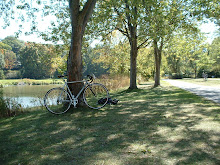
I like her take on the logic behind the vegetarian diet:
We're going to have a choice. As there are more and more and more of us, it takes an awful lot more land and resources to feed people with meat than it does [with] grain. The Earth could feed about 2.5 billion people if everyone ate the standard American diet, or it could feed 10 billion vegetarians. The fact that China is starting to eat our diet -- the more meat people eat, the more impossible it will be to eat at all.
Actually, now that I think about it, I wonder if she just finished reading Lester Brown's Plan B 2.0: Rescuing a planet under stress and a civilization in trouble. In Chapter 9 Brown writes that at a North American level of food consumption (ie heavy on meat), the planet can support 2.5 billion people, while at the other extreme, on the more veggie Indian diet, the earth could support 10 billion people.

The author also has a fairly open view of people being "mostly" veggie (and sometimes letting down their guard and cheating):
So let's say I'm an omnivore who simply cannot go without eating meat or eggs now and then. Is there anything I can do to still be as animal-conscious as possible, even though I'm eating them?
Every single time you sit down at a restaurant, you make a choice. If there's a veggie burger on the menu, don't order the turkey burger. My vegetarianism didn't happen overnight. . . . I'm still a cheating vegan: If I'm dying for Doritos -- and I know they have a bit of whey in them -- I still eat them. But I think if I wasn't a cheating vegan, I might not even be engaging in this lifestyle at all. It's not an all-or-nothing thing.
But what if I want to order or buy meat?
Some things are better than others. . . . At least if you're buying meat that has met some sort of welfare standards, you're not contributing to heinous torture. And it's better to eat an occasional piece of steak than an omelet every day, both health-wise and also because of the amount of cruelty involved. Six eggs -- what those six hens went through!
The article is here on the Washington Post website. You'd better hurry though, because I think the post quickly hides away its online articles for subscriber viewing only.

2 comments:
The article was interesting; the book is going on my short list. It sounds like a good discussion of practical vegetarianism/veganism. Definitely not radical enough for the radical vegans, but certainly a step forward from where omnivores are. She makes an excellent point about making a choice - we will have to choose a more vegetarian diet eventually if we still expect to have the resources to feed everyone.
In reply to Andie... isn't a vegan simply a vegan? Is a radical vegan one who simply does not consume any animal products ever, purposefully and knowingly, and yet a "regular" vegan one who occasionally "cheats", like Karen Dawn?
I thought a vegan was a vegan. Someone who "endeavors not to use or consume animal products of any kind". Unless perhaps endeavor is open to interpretation.
I am a vegan, and I do not purposefully, knowingly, nor willingly consume any animal products nor byproducts, not even "cheating" because my desire is so strong that I forget the suffering of the animals. I didn't realize this was 'radical'.
Post a Comment